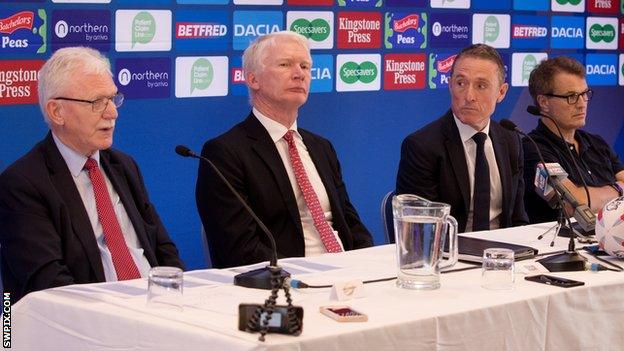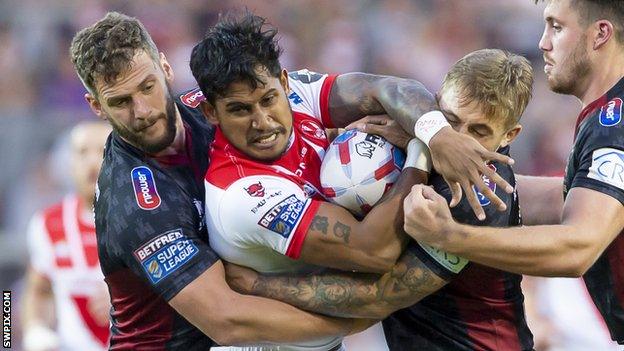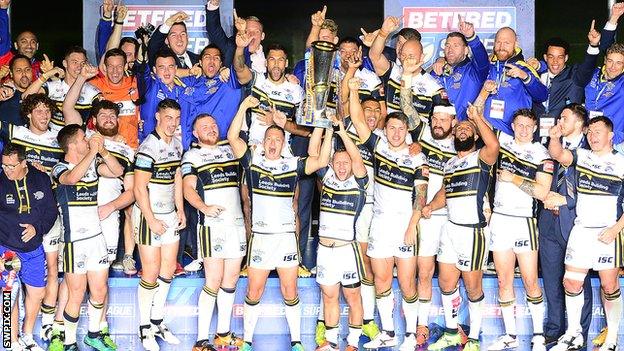Super League: The 'civil war' enveloping domestic rugby league
- Published

The chairmen of Wigan, St Helens and Warrington - along with Super League chief executive Robert Elstone (second from right) - presented their restructure proposals to the media in June
Rugby league is in a state of civil war.
An overwhelming majority of Super League clubs are pushing for a change to the current league structure, saying it is failing the sport, and they have also demanded a greater say in the marketing of the game.
But battle lines are drawn, because one Super League club - Leeds Rhinos - have sided with the Championship and League One clubs who claim it is just a grab for power and money by a handful of owners and insist they will vote down the proposals.
What could be an explosive extraordinary general meeting, called by the Rugby Football League, will discuss the proposed shake-up on Friday.
Why the big clubs want big changes
This civil war has been rumbling for several months. On the surface it is about the league structure, but deep down it is about who controls the way the game is run and financed.
Eleven of the 12 Super League clubs are against the current 'Super 8s' structure. Under this system, after a regular season of home and away matches, the top eight sides then face each other again for a place in the semi-finals and eventually the Grand Final.
The bottom four clubs in Super League go into a mini-league along with the top four from the Championship for an extended relegation and promotion play-off.
Many of the big clubs say this system is damaging to their business. They are unable to sell season tickets and corporate packages that include the Super 8s fixtures because they cannot be certain who they will play or when, until the very last minute.
They also say that poor crowds for the Super 8s matches is proof that the paying public is not interested in the format.
And they claim the current system is too volatile. Because so many sides are vulnerable to the possibility of relegation each year, they cannot put together long-term business and player-signing strategies.

Local rivals St Helens and Wigan Warriors are the top two sides in the Super League table with three games of the Super 8s to play
They have proposed a 12-team Super League, as it is now, but with only one up and one down at the end of the season and a top-five play-off for the Grand Final.
The season would be based on a home and away calendar, with six loop fixtures; clubs would play some teams three times over a league season.
Several Super League club owners have also expressed regular discontent with the game's governing body, the RFL, saying they have failed to market the game properly.
Those big clubs also want more power in negotiating any future television deals when the existing agreements with Sky and the BBC end in 2021.
They showed their determination to have more control in the running of the game when they appointed their own chief executive - Robert Elstone, who held the same role with Premier League football club Everton - to head up Super League Europe, a company that acts solely for the Super League clubs.
Elstone's remit is to increase the brand awareness of Super League and ensure the best possible television deal for the Super League clubs in 2021 and beyond.
The opposition

Leeds won the title in 2017 but have struggled this year and are still not sure of a Super League place in 2019
Leeds stand alone among the Super League clubs, having sided with the Championship and League One sides who say this is just a power grab by several of the big club owners.
They have accused the big clubs of bullying tactics; of trying to pick off some of the lower-league clubs to side with them to get their proposals voted through.
But they insist they still stand united in resisting the proposals, saying they are not in the best interests of the game as a whole, and that many smaller clubs would be forced to the wall if they went through.
They say they are willing to discuss a change in the league structure. Their proposal is for a 14-team Super League, with one up and one down at the end of each season, but also a play-off between the 13th-placed Super League team and the teams finishing second, third and fourth in the Championship.
They are concerned that having a "one up, one down" system would make it far more difficult for lower-league teams to get promoted.
But at the heart of their concerns is that the Super League clubs are in danger of getting too powerful, and that while television monies are shared now, they might not be under any future deals.
The RFL's standpoint
Rugby league's governing body has been mauled from all sides, their board of directors accused of failing to use their power to give clear guidance to the sport.
The RFL says it supports the Super League clubs' proposals, but the Super League clubs in turn are angry that the RFL has not acted decisively in implementing them.
By choosing instead to call this EGM, the RFL have been accused of meekly avoiding making a unilateral decision.
The Championship and League One clubs are angry with the RFL for not being strong enough to stand up for the whole game, accusing them of letting the big clubs and their owners ride rough-shod over them.
What's likely to happen?
Both sides have ignored some inconvenient truths.
While the big clubs have pointed to falling attendances in the Super 8s period of the season, several of them have also seen crowds fall in the regular season.
The outside criticism of those clubs is that they are too quick to blame the RFL for failing to market the game properly, when they themselves can be accused of the same failure.
The Championship and League One clubs say that the current system is working for them and that change could mean financial hardship. The truth is that many of those clubs are already suffering financial hardship, and a resetting of ambitions might actually be in their best interests.
Rugby league's general health is far from rosy at the moment, so the kind of vitriol that has been thrown by both sides in this mini-war is hardly conducive to a swift recovery in the game's fortunes.
There are several outcomes possible from Friday's EGM, including:
The Super League clubs getting their way, thanks to the support they need from at least four of the smaller clubs for them to get the majority needed.
Stalemate, with a war of words between all sides leading to no agreed outcome and the current structure stays in place for the time being for further talks to take place. That would just extend what has already been a protracted and painful affair.
A compromise somehow being found during the meeting which suits all sides. This is the least likely at this stage.
Relationships between Super League, Championship and League One clubs have been described as hitting an all-time low in the build-up to this meeting.
Whatever the outcome from the EGM, the absolute priority of both camps should be to rebuild broken friendships for the good of the game.